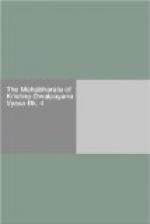[40] This sloka is not correctly printed in any of the texts that I have seen. The Burdwan Pandits read tat-samim. This I think, is correct, but then asasada in the singular when the other verbs are all dual seems to be correct. The poet must have used some other verb in the dual for asasada.
Vaisampayana continued, “And the low-minded and foolish Uttara out of folly alone, began to bewail (his fate) in the presence of the high-spirited (Arjuna) disguised (as his charioteer) in these words, ’My father hath gone out to meet the Trigartas taking with him his whole army, leaving me in the empty city. There are no troops to assist me. Alone and a mere boy who has not undergone much exercise in arms, I am unable to encounter these innumerable warriors and all skilled in weapons. Do thou, therefore, O Vrihannala, cease to advance!’
“Vrihannala said, ’Why dost thou look so pale through fear and enhance the joy of thy foes? As yet thou hast done nothing on the field of battle with the enemy. It was thou that hadst ordered me, saying, Take me towards the Kauravas. I will, therefore, take thee, thither where those innumerable flags are. I will certainly take thee, O mighty-armed one, into the midst of the hostile Kurus, prepared to fight as they are for the kine like hawks for meat. I would do this, even if I regarded them to have come hither for battling for a much higher stake such as the sovereignty of the earth. Having, at the time of setting out, talked before both men and women so highly of thy manliness, why wouldst thou desist from the fight? If thou shouldst return home without recapturing the kine, brave men and even women, when they meet together, will laugh at thee (in derision). As regards myself, I cannot return to the city without having rescued the kine, applauded as I have been so highly by the Sairindhri in respect of my skill in driving cars. It is for those praises by the Sairindhri and for those words of thine also (that I have come). Why should I not, therefore, give battle to the Kurus? (As regards thyself), be thou still.’
“Uttara said, ’Let the Kurus rob the Matsyas of all their wealth. Let men and women, O Vrihannala, laugh at me. Let my kine perish, let the city be a desert. Let me stand exposed before my father. Still there is no need of battle.’”
Vaisampayana continued, “Saying this, that much affrighted prince decked in ear-ring jumped down from his car, and throwing down his bow and arrows began to flee, sacrificing honour and pride. Vrihannala, however, exclaimed, ’This is not the practice of the brave, this flight of a Kshatriya from the field of battle. Even death in battle is better than flight from fear.’ Having said this, Dhananjaya, the son of Kunti, coming down from that excellent car ran after that prince thus running away, his own long braid and pure red garments fluttering in the air. And some soldiers, not knowing that




